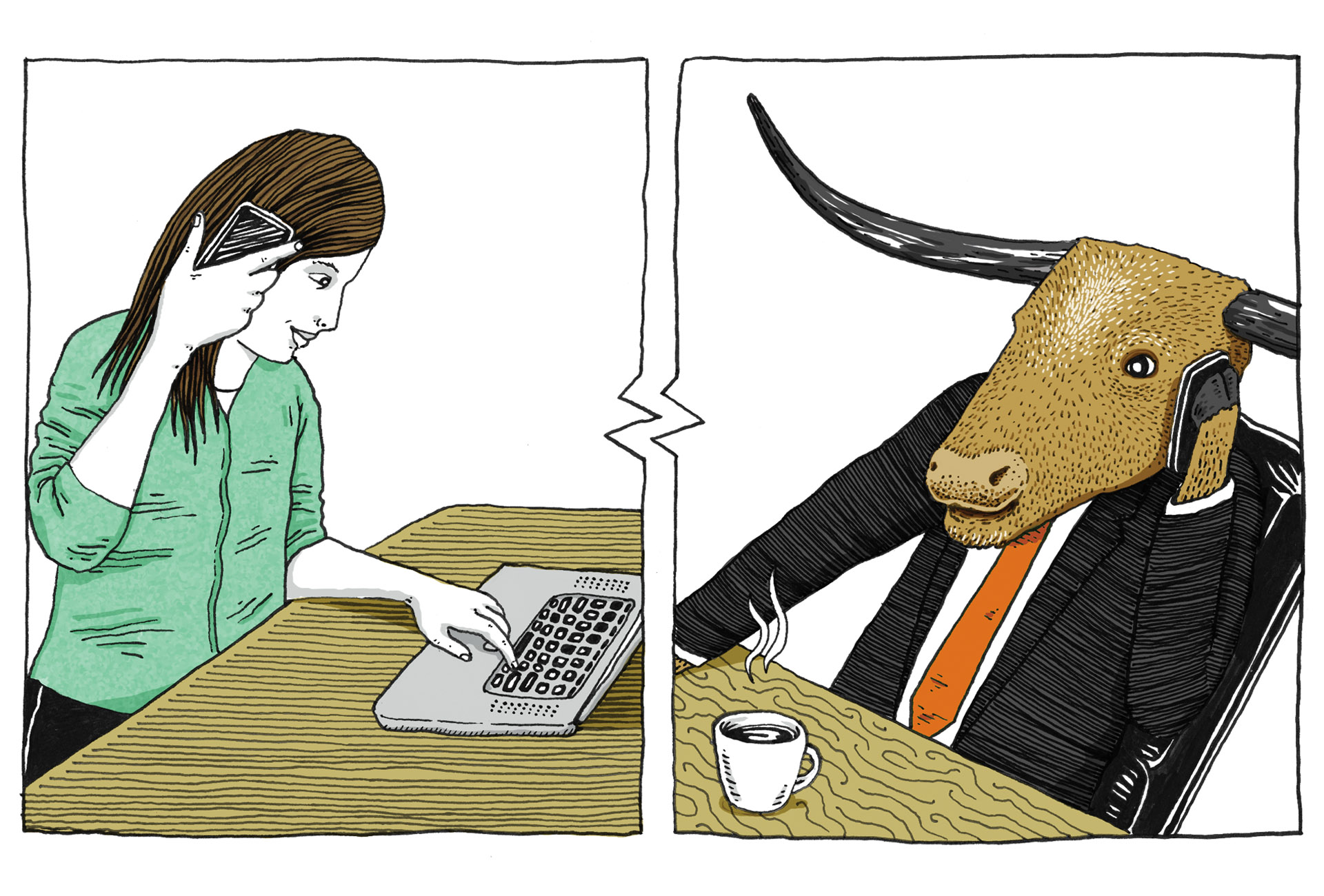Nine Ways to Rev Up Your Career
Whether you’ve landed your dream job or find yourself repeatedly pushing the snooze button each morning dreading the workday, a liberal arts education may help you forge a better career path and create an environment for innovation and productivity.
If you’re like most employed Americans, you will spend the majority of your waking hours at work. And you may spend your additional waking hours complaining about it. So how do you make the career choices that are best for you? We asked faculty, staff and an alumna from the College of Liberal Arts to share their best career strategies for success. Here’s what they said.
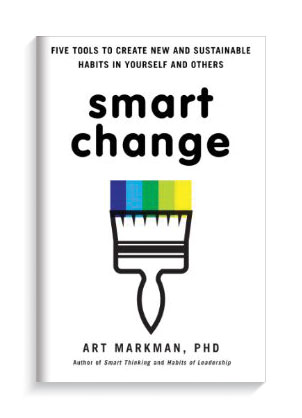
By Art Markman, professor
1. Start at the End
It’s all how you look at it, according to psychologist Art Markman, director of the Human Dimensions of Organizations (HDO) program, who encourages taking a backward-looking perspective of your career.
“Project yourself to the end of your career and ask yourself what you would regret not accomplishing by the end of your career,” says Markman, author of “Smart Thinking and Smart Change: Five Tools to Create New and Sustainable Habits in Yourself and Others”, forthcoming in January 2014. “Then, use that information to help you set out the contribution you want to make in your work life.”
However, the road to career contribution is paved with many distractions. Whether it’s an exploding email inbox competing for our attention or a noisy cube mate, understanding how the brain works may help us overcome those pesky distractions to be our most productive without sacrificing quality.
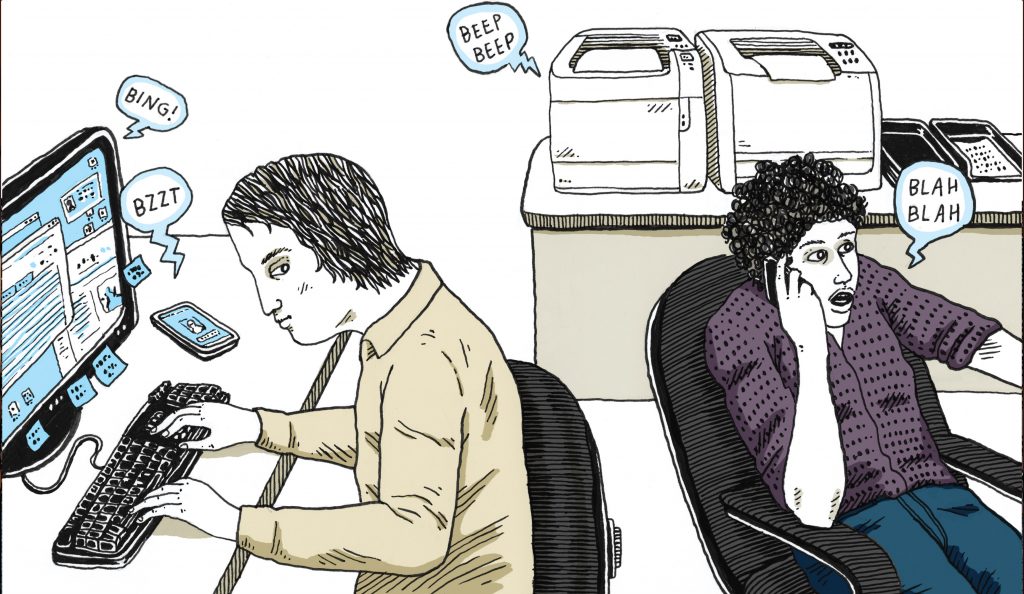
2. Create a Space that Fosters Good Habits
“You have to understand that the human brain does not multitask,” Markman says. “It time-shares.”
He warns that when we try to multitask—flipping back and forth among tasks rapidly—quality suffers. Markman’s advice: Keep your cell phone shut off at work as much as possible, check your email only a few times a day and avoid using instant messaging. That will help to reduce the temptation to multitask while keeping you focused on the big-picture jobs you need to complete.
In addition to multitasking he says there are a number of ways the modern workplace derails us from doing our best work. One example is the open office systems where people do not have their own desks.
“It is difficult for people to create an environment that is tailored to their own work behaviors,” Markman says. “As a result, people cannot develop good habits. It is important to help people at work to develop good habits and then to help them maintain those habits.”
3. Build a Good Neighborhood
Don’t switch zip codes or grab your hard hat just yet. Building your career neighborhood doesn’t involve relocation, but it does require relationship building.
“Neighbors are people who keep in regular contact and are willing to go above-and-beyond to do things for each other,” Markman says. “When a workplace functions like a neighborhood, then people look out for each other and are motivated to help the group succeed.
“When the group starts to treat each other like strangers, then every little task needs to be negotiated and done by contract,” he adds. “In that situation, individuals within the group are motivated only by self-interest.”
The consequence? The breakdown of a neighborhood makes it increasingly difficult for an organization to reach its goals.
4. Use Social Science; Your Customers Will Thank You
A positive trend Markman observes is that many companies are beginning to use information from the social and behavioral sciences to reach their customers more effectively. Amazon uses interface designers with a cognitive science background to create an easier website user experience. Procter & Gamble has a behavioral sciences group that takes the latest research and applies it to problems within the company. And recently, the HDO program helped Special Operations Command in the U.S. Military to develop new structures to bring people together and improve innovation.
“The liberal arts help you to think about people by having a deeper understanding of the human condition,” Markman says. “With that background, you are better able to see both how people’s characteristics influence the way they act as well as the role that situations play in people’s responses.
“You come to understand how the diversity of members of a group can allow that group to function effectively and achieve creativity,” he adds. “These skills are highly valued in the modern workplace, because there is a growing recognition in business that success is fundamentally about people.”
5. Be a Problem Solver
“I hear recruiters tell me that the most important skills that they look for in hiring is to find people who are problem solvers and creative thinkers,” says Orlando Kelm, an associate professor in the Departments of Spanish and Portuguese and Marketing Administration at McCombs School of Business. “That is exactly what liberal arts majors study.”
He often sees expatriates trying to conduct their work abroad the same way they would in the United States instead of embracing the differences.
“A liberal arts background gives them the ability to interact with their local partners by talking about art, history, language, politics, religion and literature,” he says. “It’s what gives them the edge beyond that which is just work.”
6. Embrace the Best of Both Worlds
Kelm says he particularly values seeing how people from different cultural perspectives look at problems with a unique solution.
During a recent visit to Peru and Chile with a group of Korean executives, Kelm heard a lot of companies talk about their corporate social responsibility programs. He says he initially thought the Koreans would be impressed.
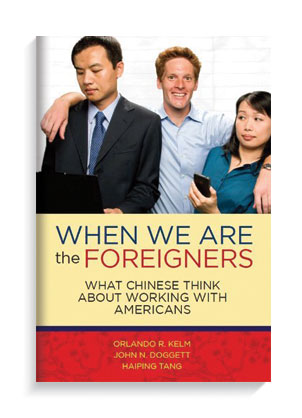
However, from the Korean perspective, they were more curious as to why the Peruvians didn’t focus their efforts on educating their youth first, which in turn would create a generation of new workers, who would also improve social responsibility.
“To me, this is the opportunity of multicultural teams,” says Kelm, author of “When We Are the Foreigners: What Chinese Think About Working With Americans.” “That is, they allow us to work with people who look at challenges from new perspectives.
“Too often with cultural differences we start with an attitude that people from the other culture are stupid because they do XYZ,” he says. “I like to start with the premise that in general people are smart, and so there must be a logical or good reason why they do the things that they do.”
During his trip to Peru, he and the Korean executives visited energy companies outside of Lima. Some of the executives complained to each other about the size of the bus.
“What they didn’t understand is that we were going to be taking them along unpaved roads and the larger buses would not have been able to handle the roads that we were traveling on,” Kelm says. “The locals knew which bus would be best for the terrain. Whenever things seem ‘stupid,’ chances are that we have just not figured out the reason behind it. Sometimes the reasons are historical, but we still benefit from trying to discover why.”
Kelm’s advice: If one culture is strong at planning and organization and the other culture is good at flexibility and spontaneity, rather than reject one side as “wrong,” try to incorporate the best of both. Similarly, if one culture is good at following rules and another is good at adjusting behavior to the situation, rather than the rules, try to combine the best of both.
7. Ask Yourself, What Will I Do in the Next 24 Hours?
Robert Vega, director of Liberal Arts Career Services, likes to end career-coaching sessions with a simple question—“What will you do in the next 24 hours?”
“Don’t just think about it, make it happen,” he says.
By helping students strategize a career search plan with manageable goals, he and his team are helping them to think and actively engage in preparing for life after graduation.
Employer surveys confirm that effective communication skills, taking initiative, creative problem solving, critical thinking and analytical abilities are some of the most important competencies of today’s employees. These attributes make liberal arts students a tremendous asset to any organization.
“Liberal Arts does not necessarily have one career path,” Vega says. “Some paths are linear, leading directly into a career for which the student has spent the last four years preparing. Others are winding, with curves and rolling hills along a path filled with a variety of experiences, from backpacking to community service and graduate school to entrepreneurship.”
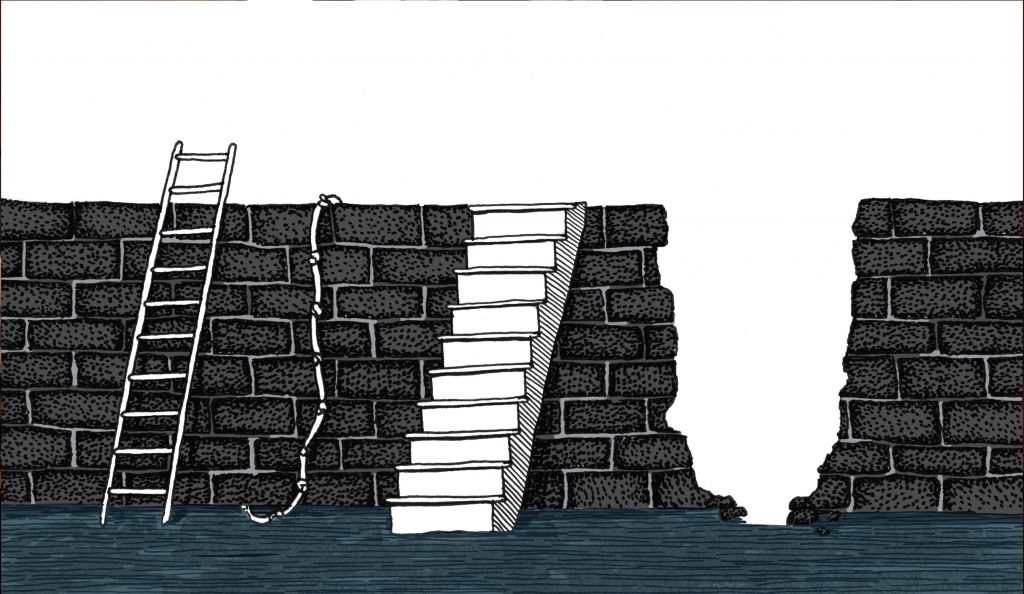
8. Use Your Longhorn Network
Alumni have full access to Liberal Arts Career Services for up to one year after graduation and lifetime access to the campus-wide job posting board, AccessUT, which represents all industries and experience levels.
For alumni exploring their career options or for those who might be contemplating a career transition, Vega recommends searching the Texas Exes LinkedIn account, where alumni can connect with each other in a plethora of career fields.
“Networking with other Longhorns in an area of interest can help those in transition learn more about a career path and build a network of potential job-search advocates,” Vega says.
9. Test Drive Careers
Students in the career exploration stage can take advantage of internships in a variety of fields that allow them to “test drive” a career they may find interesting.
In spring 2013, Cristina Flores, Sociology ’13, had the opportunity to intern at the Social Office in the White House under the direction of the Office of the First Lady, Michelle Obama. She worked on 30 cultural, political and social events including a PBS Performance at the White House, the annual Easter Egg Roll and Inauguration events. She also communicated with constituents, public figures, talent and volunteers.
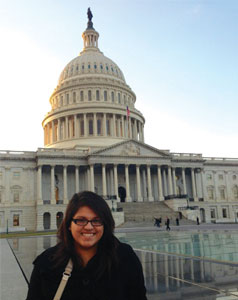
Having completed a variety of internships over the last two-and-a-half years, Flores says she’s learned a lot about herself and the type of work she likes and dislikes without having to commit to one career.
“I have learned I like working in a fast-paced environment where I have to be on my toes rather than a place that has a lot more down time,” Flores says. “I enjoy working with people and having constant communication with communities. I also learned I don’t want to have a career in one sector forever.
“Having a balanced life between work and social life is important to me, especially if I hope to have a family in the future,” she adds. “Most importantly, I learned there’s no one that can push me as hard as I can push myself.”
During her freshman year, Flores took the Crime and Violence in Urban Latin America class with Professor Bryan Roberts, which helped her decide on sociology as her major. The class covered Latin America, immigration, education, women’s rights, government, crime and violence.
“I felt that with this major I could touch on all the topics that I was passionate about and didn’t have to decide on just one,” she says. “Loving science in high school, I did a lot of work on scientific methods and the fact sociology also incorporated scientific methods really made this the perfect major for me. I was able to study human social behavior, which is part of everyday life.”
Flores is back in Washington after receiving a Running Start Fellowship to work for a congresswoman and learn about running for office one day. Her ultimate career goal is to become a U.S. ambassador.
She credits her liberal arts education for giving her an advantage in written and oral communication, problem solving, statistical skills, foreign language, critical and analytical thinking, interpersonal skills and adaptability to change.
“I wouldn’t be where I am today without my liberal arts education,” Flores says. “With the wide variety of courses available, I was able to have a less career-focused curriculum. This allowed me to grow as an individual and be prepared for anything thrown my way.”
